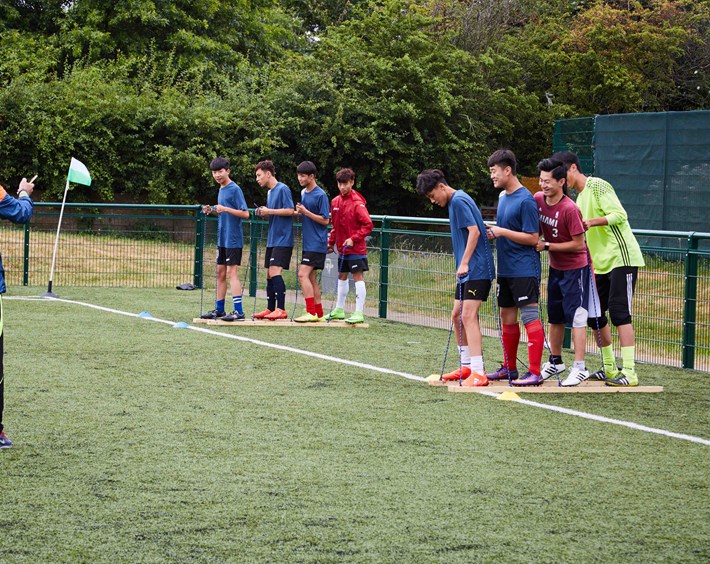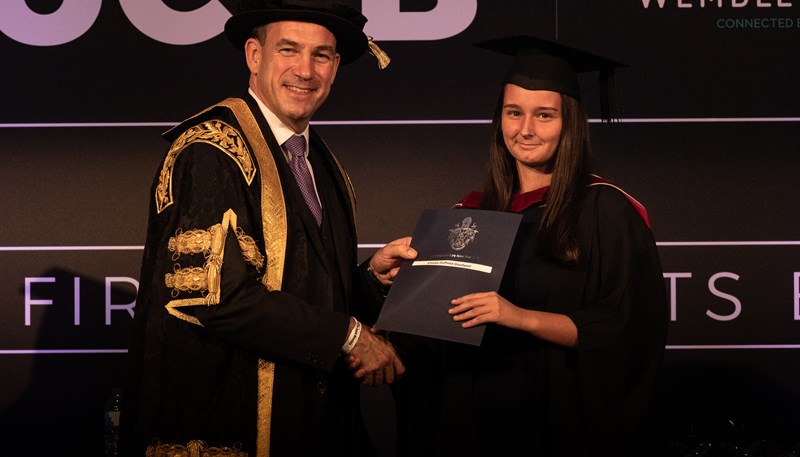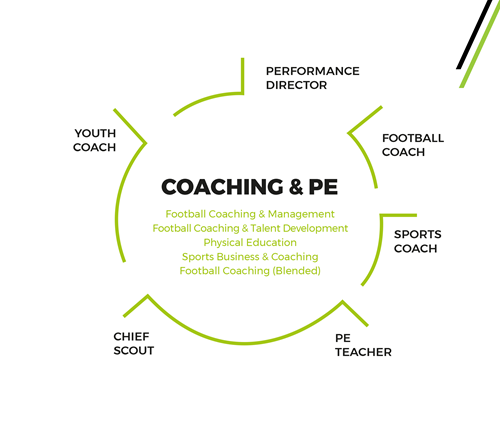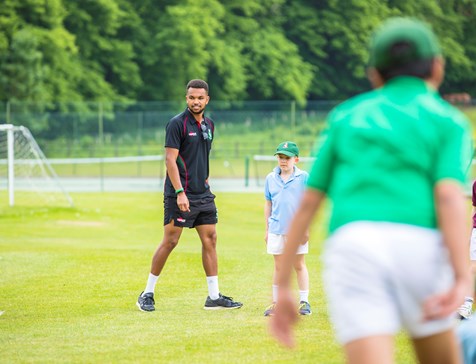Degree overview
Only 15.5% of children are achieving the recommended 60 minutes of sport and physical activity a day. Physical Education at UCFB provides students with a pathway to change this and make a real difference by inspiring the next generation of children to get away from their mobile phone and out into the park. This degree is designed for those with a passion for physical activity, exercise and sport to carve a future in physical education teaching and leadership.
Students on the physical education course, at UCFB, will explore the fundamentals of teaching physical activity by supporting professional teachers and sports coaches out in the local schools and community. The course will focus on sport pedagogy, the delivery of a variety of practical sessions and the mechanics of teaching and coaching.
This degree will build the skills that are needed to become a confident physical education practitioner; it will also provide the experience and knowledge required to gain work in schools, outside coaching companies and in other physical activity establishments. Students will develop the practical and theoretical understanding of the two key areas needed for physical educators; becoming an expert in physical activity and an expert in teaching and sport pedagogy.

Degree content
Physical education students will explore the national curriculum and the established importance of physical activity and will cover a range of sporting options including the six key areas that schools require; athletics, games, gymnastics, dance, swimming, outdoor and adventure activities.
Work within local schools is a key feature of this course and many of the in-class sessions will be supporting students’ own practical placements and providing information and reflection time to learn from their real-life teaching experiences.
UCFB Wembley students have been placed at a number of schools including Ark Academy, St Joseph's primary school and Wembley Park primary school, as well as sports clubs Wembley Stallions and QPR. UCFB Manchester Campus students have gained experience at Connell College and St Agnes' primary school, as well as sports organisations including the National Gymnastics Centre, British Dodgeball and British Triathlon.
Physical activity study requires students who have the ability to read and study independently, manage their time and marry theory with practice.
Students completing this course will be equipped to apply for PGCE courses, graduate teacher training in-school programmes or work in any area of physical activity delivery such as personal training or afterschool coaching. This degree programme also provides transferable skills to other careers e.g. research, further study and health work.
Students will explore the national curriculum at primary and secondary school level and be involved in the full range of practical areas: games, swimming, athletics, gymnastics, dance and outdoor and adventurous activities.
This will enable you to have a complete background to move onto PGCE teacher training or be a community sport leader. The programme will also consider key youth sport issues such as the obesity crisis and the need to promote physically active lifestyles.
Teaching locations for this degree include:
UCFB Manchester Campus - Please note: UCFB Manchester Campus option is not available for 2024 entry.
In addition to our teaching locations, we also use specialist facilities throughout the academic year as well as additional facilities where required.

I have just secured my first teaching job! Thank you to all at UCFB for all your help on my degree!
Modules
- Skills for Learning
- Mental Wealth
- Research Project
- Contemporary Issues in Sport
- Theory of Coaching
- Principles of Coaching
- Principles of Teaching
- Teaching and the Practical Delivery of Sport
- Industry Competencies (Mental Wealth)
- Sports Science in Practice
- Delivering a Broad Curriculum
- Cybernetic Physical Education
- Psychology for Physical Education
- Creative Physical Education
- Industry Readiness (Mental Wealth)
- Research Methods
- Sociology of Physical Education
- Behaviour Management
- Innovations in Education
- Experiential Learning
- Professional Project
- Sports Initiative Development
- Industry Engagement (Mental Wealth)

University Campus of Football Business is an embedded college of the University of East London. All graduates that complete their studies with UCFB will receive a degree from the University of East London.
Click here to download the programme specification
- QAA Subject Benchmark Statement for Events, Hospitality, Leisure, Sport and Tourism (2019)
Visit the QAA website to access each of these benchmark statements.
Entry requirements
- UCFB Wembley course code: PE1F
- Institution: U10
- Campus: W
- UCFB Manchester Campus course code: PE1F
- Institution: U10
- Campus: E
- 64 UCAS tariff points or equivalent non-tariff qualifications
- GCSE Maths and English Language (Grade C/4 or above) or equivalent e.g. Functional Skills Level 2
- International applicants will be asked to pass the Academic IELTS test with a minimum overall score of 6.0 and no less than 5.5 in each of the four elements
All applications are reviewed on a case by case basis. If your academic achievements do not meet the minimum level required but you have considerable professional experience, please contact admissions@ucfb.com.
Please be aware that all applicants who do not hold British or Irish nationality will require a visa to study in the UK.
Our access to a UK Government Student Visa licence is currently being reviewed. This means we are unable to consider applications from any applicant who would require a student visa to study in the UK as we cannot issue a Confirmation of Acceptance for Studies (CAS).
If you are unsure whether you would need a visa to study in the UK, or for more information, please contact compliance@ucfb.com.
If you don’t hold a visa for the UK and would still like to study with UCFB, please consider Football Coaching (Distance with Attendance).
- UCFB Wembley course code: PE10
- Institution: U10
- Campus: W
- UCFB Manchester Campus course code: PE10
- Institution: U10
- Campus: E
- 96 UCAS tariff points or equivalent non-tariff qualifications
- GCSE Maths and English Language (Grade C/4 or above) or equivalent e.g. Functional Skills Level 2
- International applicants will be asked to pass the Academic IELTS test with a minimum overall score of 6.0 and no less than 5.5 in each of the four elements
All applications are reviewed on a case by case basis. If your academic achievements do not meet the minimum level required but you have considerable professional experience, please contact admissions@ucfb.com.
Please be aware that all applicants who do not hold British or Irish nationality will require a visa to study in the UK.
Our access to a UK Government Student Visa licence is currently being reviewed. This means we are unable to consider applications from any applicant who would require a student visa to study in the UK as we cannot issue a Confirmation of Acceptance for Studies (CAS).
If you are unsure whether you would need a visa to study in the UK, or for more information, please contact compliance@ucfb.com.
If you don’t hold a visa for the UK and would still like to study with UCFB, please consider Football Coaching (Distance with Attendance).
We accept applications with advanced standing via our Advanced Prior Learning (APL) application process. Should you wish to apply for direct entry into Year 2 or Year 3 of one of our undergraduate degree programmes, you will be required to complete an APL application form and provide us with evidence of your previous studies.
Please contact admissions@ucfb.com for further detailed guidance. Please note that should you wish to apply via this process, we strongly encourage you to begin the application process early in the cycle and you will still be required to complete a UCAS application.
All applications for an undergraduate degree programme are submitted via UCAS. To apply, please visit UCAS.com.
Career prospects
Career paths include progressing onto a PGCE course to complete teacher training or joining a graduate teacher training programme. Alternatively, graduates could work through the non-qualified teacher route; working in the physical activity or health sector as a personal trainer, wellness facilitator or for sports delivery companies e.g. Sport co-ordinators in clubs and schools.

Over 90% of UCFB graduates are in employment within six months of graduating and almost two-thirds of them work within the global sports industry.
At UCFB we bridge the gap between education and business, allowing a unique approach to education. We provide two curricula; the academic curriculum which encompasses exams and coursework and the Employability & Career Planning programme – a three year journey of professional and personal development.
This provides access to best-in-class industry guest speakers, additional qualifications and exceptional opportunities to apply for work experience placements to ensure our students graduate as well-rounded, empowered professionals.
Find out more about your career journey at UCFB

Each of our UCFB undergraduate degrees is underpinned by an embedded strand of learning and skills development, including a formalised a short work-placement opportunity, to better equip students for the 21st century workplace and enhance employability opportunities.
This allows students to develop a set of key transferrable skills to ensure they are ready for the modern workplace when they graduate, including emotional, social, physical, cultural and cognitive intelligence, digital proficiency, industry and community connections, and giving back to the community through projects and volunteering.
Every UCFB degree has one Mental Wealth module in each academic year to cover these skills, and our learning outcomes for all modules are closely mapped to these same competencies in order to maximise graduate's industry readiness and career opportunities.
It’s not just in club academies around the country where the talent of tomorrow is nurtured – it’s also on the playgrounds of the nation’s schools.
Read more
Tuition fees for 2024 entry
Visit our dedicated page about fees and student finance.
The provision of a facility or service including accommodation may be subject to an additional charge (i.e. separate from tuition fees). Where this is the case, we will make this clear in advance and payment for such service shall be made in accordance with any additional contract made between you and the University.
In some instances, optional activities provided by UCFB may carry an additional cost for participants (e.g. qualifications with external certification such as FA Coaching Badges). Any additional costs will be provided to students in advance of any such sessions running.
Students are required to purchase UCFB branded kit for use on practical based modules and on work based experience sessions. This costs £120 and is required each year of the programme. Travel to external teaching venues and work based experience/placement may also be required, of which costs will vary. CRB check costs are also necessary and vary from £24 – £44, depending the level of check you choose.
UCFB has a range of scholarship and bursary options to help with the cost of studying and to encourage students to embrace their time at UCFB and graduate with more than just their university degree. Click here to learn more.

UCFB provides an exceptional environment to live and learn in, with state-of-the-art facilities in two inspirational campuses in London and Manchester.
Find out more

















